#I still need to analyze Chosen in this episode
Explore tagged Tumblr posts
Text
I've seen a lot of post-Wanted ideas suggesting that Victim is envious of the relationship Orange has with Alan, but what if it's not about that. What if it's not the relationship that Victim envies.
After all, Chosen was the one the mercs were hunting down. They only got orders to bring Orange in when he appeared and interfered during their active pursuit of Chosen.
And Chosen...didn't have a very enviable relationship with noogai, to say the least.
So why, if the relationship with their creator is the source of Victim's contention, would he focus on Chosen?
Orange's and Alan's relationship is something that's developed with time, and communication, and honest effort on the part of both parties involved. But they began as two enemies extending a cautious truce because they wanted something from each other. Orange's and Alan's relationship was only even possible because Alan chose to spare Orange, and why did he do this?
There's no denying that they've come far since then, but still...whatever his reasons may be in the present day, Alan originally kept Orange around because his art skills made him valuable to Alan.
Orange got to live because the animator found a way to make use of him.
Now let's consider Chosen.
Given how noogai handled Victim when he got out of hand, you'd think he'd handle Chosen in a similar way. Especially since Chosen got much more out of hand. But, no. The animator doesn't simply rid himself of Chosen.
Chosen got to live because the animator found a way to make use of him.
Of course, there are important differences between them. Orange got a say in their terms; Chosen certainly did not. Orange was utilized in a way that enabled his skills to flourish, and allowed him some agency in their application; Chosen had limits and restrictions imposed upon his capabilities, and little to no choice in what manner him impeded skills were implemented. Orange is free to come and go as he pleases, but has elected to remain on the computer voluntarily; Chosen was held in captivity, and escaped the moment an opportunity popped up. Orange was released; Chosen freed himself. Alanspc is home, to Orange, and the animator is part of that; Chosen has only ever returned to Alanspc in times of crisis, and it's never been for the sake of the animator.
Orange is happy, with his creator.
Chosen suffered, under his creator.
But.
When you take away all the context surrounding Orange's and Chosen's respective histories with their creator and look at just the simplified timeline of events, what do you get?
The animator defeated Orange, and then kept him, alive.
The animator defeated Chosen, and then kept him, alive.
And what must that look like, to Victim?
Victim, who fought and fought for every second he got, and was dismissed as worthless? Victim, who battled the animator nearly to a standstill without even leaving the animation window, all without powers, using wits and resourcefulness alone, only to be brushed away? Victim, who did so much with the little time he had that he was still on the animator's mind when noogai created Chosen, and yet wasn't worth keeping around?
Chosen went on to spend almost five years on the computer, after his defeat. Would it matter to Victim, that Chosen spent those near-five years enslaved and miserable? Or can Victim only see the near-five years of life that Chosen got to have while Victim was denied?
Victim lived for fewer than two minutes. Quality of life might be negligible next to having a life to live at all.
He might not realize that the animator's decisions to spare Chosen and Orange were directly tied to how much control the animator could maintain over them. He might not understand that he was noogai's first living stick, and mistakes were bound to be made. He might not understand how noogai has changed, and how this has changed the way noogai sees stickfigures. He might not realize that the animator doesn't keep sticks anymore, doesn't determine their right to live based on any notions of usefulness that they could provide to him, doesn't make them stay. He might not believe that, given a second chance, Alan would do better by him.
All that matters to Victim is that the animator saw something in Orange and Chosen. Something that he didn't see in Victim. Even though Victim proved himself countless times over, in the fewer-than-two minutes he got.
#animator vs animation#ava6#ava wanted#theory#this is probably the last time I make a Victim theory until the next part of the series airs#I still need to analyze Chosen in this episode#sorry that's taking so long
115 notes
·
View notes
Text
I’ve been meaning to write this for a long time because it’s something that keeps me thinking. So many people talk about the fashion in The Nanny, but almost no one mentions the MUSIC. I consider it a key factor in the show as it doesn't feature a lot of music in general. Sure, there are the jingles between scene changes, but I mean actual songs with lyrics. While they aren’t used often, the few times they appear are super meaningful. I recall three (there might’ve been more) but these stand out the most. And two songs are like clues for us to follow, even if indirect, that were supposed to fulfill in few another seasons into the future.
Let’s start with the most obvious one: the final episode and Barbra Streisand’s Memories. I hardly need to explain why this song was so impactful, but I will anyway. The choice of Barbra’s song is so smart as she was brought up in the show so many times as Fran’s muse and the lyrics match the storyline perfectly – it was such a thoughtful decision by the creators. The song ties everything together in the finale, closing the chapter on Fran’s journey in a such beautiful, sentimental way.

Second song is from the Kindervelt Days episode when Fran is supposed to go to a reunion with Eric Estrada, but eventually Maxwell shows up and dances with her to Two Different Worlds. It took me some time to find the exact song, but I was determined to prove my point. Here we go with the lyrics:
Two different worlds We live in two different worlds For we've been told that a love like ours Could never be
So far apart They say we're so far apart And that we haven't the right To change our destiny
When will they learn That a heart doesn't draw a line Nothing matters if I am yours And you are mine
It’s clear that the song choice wasn’t random. The song is a foreshadowing of Fran and Maxwell ending up together, even though this was only the second season. Despite the “will-they-won’t-they” tension that ran through much of the show, the writers were suggesting that Fran and Maxwell were destined to be together, not only by the actions but also by the words in the background.

The third song, most important for me as a C.C. and Niles shipper, is from The Nose Knows episode. C.C. and Niles dance to Our Love is Here to Stay. Given how MEANINGFUL the songs in this show are, I believe this one was deliberately chosen to indicate where their relationship was heading. The title alone, Our Love is Here to Stay, tells us everything we need to know. Look at the lyrics:
It's very clear Our love is here to stay; Not for a year But ever and a day
The radio and the telephone and the movies that we know May just be passing fancies And in time may go But, oh my dear Our love is here to stay Together we're going a long, long way In time the Rockies may crumble, Gibraltar may tumble They're only made of clay But our love is here to stay
It was CLEARLY a planned moment, and for anyone who claims their relationship came out of nowhere, I think this song proves otherwise. I believe with my whole little cold heart that the writers were signaling, even if indirectly, that C.C. and Niles were always meant to end up together. Their love was supposed to be just like the lyrics say – I’ll defend that with my life.

And you know what I love most about The Nanny? How it seems to be a silly sitcom, but in reality there are so many layers to uncover if you take the time to look. I really believe the writers used these little details – like the songs – to communicate something deeper. As someone with a literary background, maybe I’m prone to analyzing things a bit more intensely than most people, but it’s so exciting to find hidden gems like these in a 90s sitcom.
Of course, people can enjoy the show without digging into the hidden meanings, but for someone like me, bounded with words both professionally and personally, I can’t help but appreciate the writers’ craft. Eighteen years after I first started watching, I’m still rediscovering new things, and that’s part of what makes the show so brilliant.
So yes, I really do think the music (which is three songs lol) is crucial to understanding the show’s emotional depth. These tiny little details make the experience so much better.
PS. Professionally speaking: this essay sucks, cause there are too many points I’m debating about and there is no sensible conclusion. Thanks for reading anyway.
#the nanny#cc x niles#fran x maxwell#c.c. babcock#niles the butler#fran fine#maxwell sheffield#importance of music and lyrics#this show's an onion#so many layers#brilliance of writing#indirect hints#nuances#also I borrowed the CC/N GIF and I'm not sure if it's tagged anywhere
43 notes
·
View notes
Note
Good day!
On the topic of using Zoé in a Chloé-redeeming story: I believe there's a way.
It's merging Zoé's character with Lila.
Zoé is introduced early on, but appears to be just as in canon: as a near-perfect, shy, taleted actor who tries to fit in her sister's school. Chloé is faced with the fact that everyone likes her sister more. Chloé's schemes start falling apart far too often due to Zoé's constant "accidental" interventions. And of course, Zoé is always ready to extend a helping hand to guide Chloé on the right track.
Even though she may sometimes feel a little bit too patronizing.
Even though Zoé is sometimes too good of a liar and we here dark stories of her past — but that's the past! She tried to fit in, to protect herself from bullies, she's turned over a new leaf!
Even though the class now bends over backwards to help Zoé with the littlest things, as she promises to introduce them to her Hollywood acquaintances (she does have these connections... usually. She doesn't hurry with any introductions, though).
Then, when Chloé's redeemed, and Hawk Moth cornered... Backstab!
A skilled liar has gotten on Ladybug's team and in the Agreste mansion at the same time — and now she's chosen her side.
Pros: "Two wrongs make a right" — two faulty characters combined make a more well-rounded one. Zoé's acting background makes Lila's super-lying make more sense, Lila's facade explains Zoé's too-good-to-be-true vibe. Also, since we don't say "this is a liar villain!" outright, she has time to build up her schemes.
Cons: doesn't work in an episodic narrative. At all. And does this really count as "using Zoé's character" if it requires merging her with a different one?
Have a nice day!
(Post this ask was in response to)
I like this idea, but you already pointed out the biggest problem:
Does this really count as "using Zoé's character" if it requires merging her with a different one?
Like I said in the original post, there are a lot of ways to make Zoé interesting, but they all require major changes to her character and I consider that failing the assignment. It's not that ideas like yours are bad! As I said above, I actually like this a lot! Lila desperately needs a stronger tie to the main cast. Having her be related to Chloé would have been great way to do that and would have even mitigated some of the issues with the Chloé and Lila team up plot! No reason to do the Derision retcon if Chloé has a non-Marinette-based reason to team up with Lila. It even has the potential to be more in line with how Chloé was played in season three where she was far less willing of a pawn than she would end up being in season five.
However, I don't think Zoé fans would be thrilled by this change and, generally speaking, that's who I'm trying to please when I propose general changes to a character. I'll get more out there for specific scenarios, but for posts like the linked one? Here what I do: I analyze canon to try to figure out what the character's core roles, relationships, and traits seem to be. The things that truly define this character and draw fans to them. Then think about how I could keep those things completely - or at least mostly - intact while making changes to better develop and flesh out the character.
As an example, I feel comfortable making major changes to Lila so long as she's still a manipulator and a villain since those are her core character elements. They're a strong basis to work with, but far from a complete character, making her a great choice for a myriad of fixes. Lila really can be almost anyone, which is rather fitting.
Adrien, on the other hand, is reasonably well developed making it hard to do any major changes to him. Luckily, he doesn't need any. Most of my fixes for him focus on cleaning up his backstory and giving him actual character arcs once the main story starts.
When I look at Zoé and try to find her core elements, I'm stumped. I can't figure out anything unique about her outside of her role as a nicer replacement Chloé. That's not a solid role to build the character around since it only comes into play in super specific moments like getting Marinette into the Diamond Dance or having the mayor let the kids use the Eiffel Tower for the school dance. Outside of that, Zoé's just another generic nice person that blends into the crowd. Her hobbies aren't even unique! Adrien and Mylène were established as actors all the way back in season one and this isn't a show about an acting troupe, so why do we need a third actor on the team?
23 notes
·
View notes
Text
I would like to focus on the music chosen for Hob Gadling's 80s sequence.
I'm extremely late to the world of The Sandman (finally binged it two weeks ago after my mother had been begging me to watch it with her and now I'm more obsessed than her) Bottom line: I'm unbelievably glad I finally watched this beautiful piece of television.
I have yet to read the comics but as for the first season, I have to say, without a doubt, my favorite episode is Chapter 6: The Sound of Her Wings. Death's 20-min segment is a beauty unto itself, but I'll be focusing on Hob's segment today. Specifically, his 80s scenes.
Considering I'm so late to this fandom and exploring all of its wondrous details and themes, excuse me if this has already been noted. I've been thinking about these details over and over but I need to get it out there in the Sandman world and hear everyone else's thoughts.
*Also excuse the terrible photos - Netflix doesn't let you screenshot and I was too lazy to get another app to let me bypass it. Please bear with my photos of my laptop screen.*
There are three songs that play throughout this sequence.
#1 - "She Drives Me Crazy" by Fine Young Cannibals
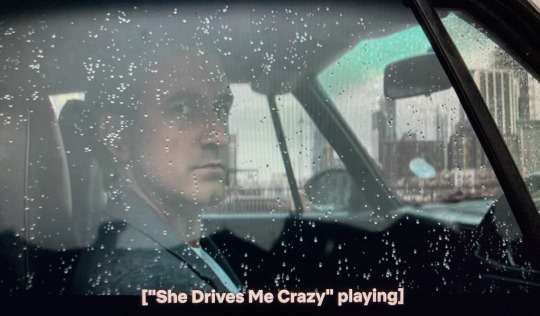
I accidentally deleted half my post mid-writing this but here I go again.
As we can see, after the breakup scene, we open up on Hob Gadling (he looks amazing in his 80s look, by the way) and this song plays.
Here are the lyrics:
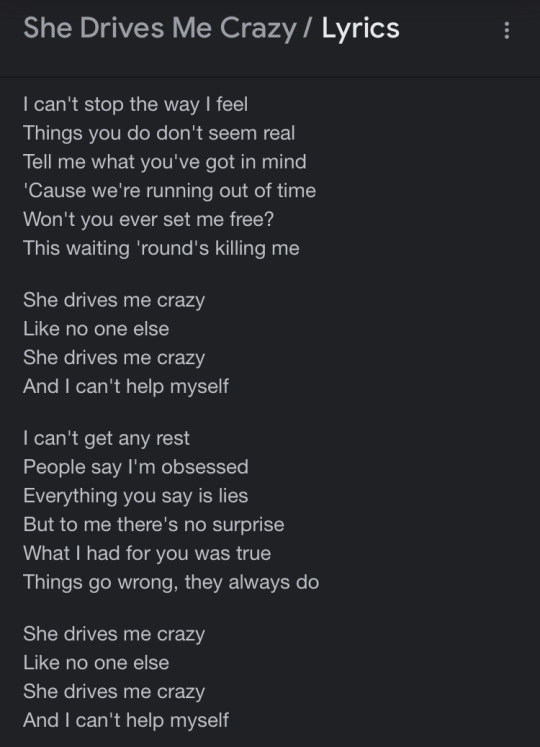
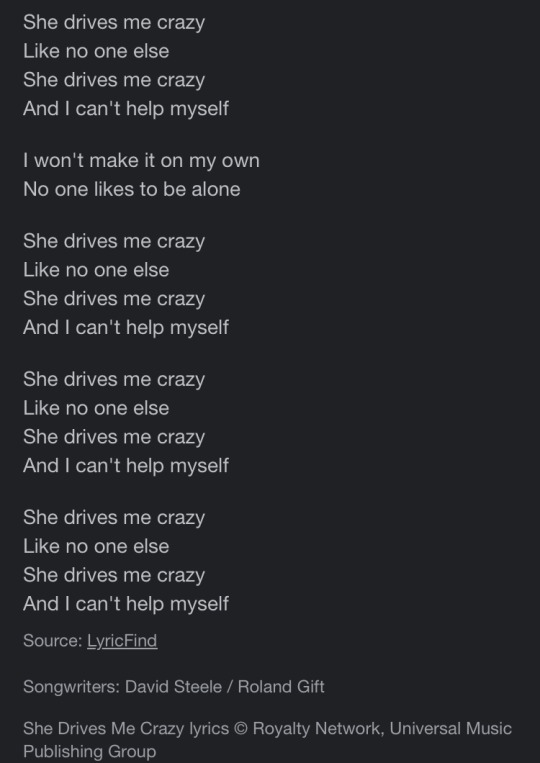
I mean - where do I even start LMAO.
*Let me just give another note - regardless if you ship Dreamling romantically or not, I will be merely analyzing these lyrics as they are and how they convey Hob's feelings for Dream in general. But, I mean, the songs are THERE, the text is THERE. So do with that what you will.*
This will go for the following two songs as well, but these songs are placed with meaningful intention. Each of these offer a unique lens and dive into Hob's feelings.

I won't be annoying and over-explain anything, but the lyrics are clear I feel:
"She drives me crazy" - cough
"Things you do don't seem real" - in Hob's view, Dream literally is an enigma. Hob has no idea the capacities, the limits, and even the name of this being he meets every century.
"This waiting 'round's killing me" - well.
"Everything you say is lies" - now I wouldn't say particularly lies, but Dream does keep and omit things from Hob. Understandably, Hob would find himself in a confused limbo with Dream.
Here's the kicker:
"I won't make it on my own/No one likes to be alone." - HELLO. I mean, if this isn't the core message and pinnacle of Dream and Hob's lesson to immortality.
As Death mentions earlier in the episode, around 18:10, "Most of us will be glad for the company of a friend."

I feel I could go on forever and ever about the beauty of this episode and how well The Sound of Her Wings and Men of Good Fortune intertwine. They beautifully complement each other as stories lamenting the dichotomy of life and death, and the joys of humanity.
But essentially, Death reteaches Dream how beautiful humans can truly be, and in this pivotal moment, she says this zinger of a line. The camera was initially on Death but for THIS line, it cuts to Dream.
BECAUSE - poor Dream is definitely in need a friend.
Which is then shown to the audience by the 30-min long Hob Gadling sequence that ensues, and we see Dream's aversion to needing someone, to needing a friend.
But I digress - back to the song, and that one line about not wanting to be alone.
That is such a poignant line, because as much as Dream felt alone and needed company, so does Hob? An immortal, constantly seeing the death of others around him, his companions and family long gone, he needs someone.
Considering this 80s sequence ruminates so heavily on post-breakup feelings, Hob is missing Dream dearly. His constant in life.
I'm rambling too much, onto the next one!
#2 - "Shattered Dreams" by Johnny Hates Jazz

Time skip to perhaps a few hours later, who knows. We see Hob still waiting for Dream, alone in the pub.

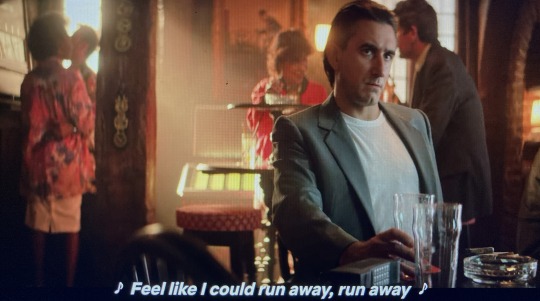
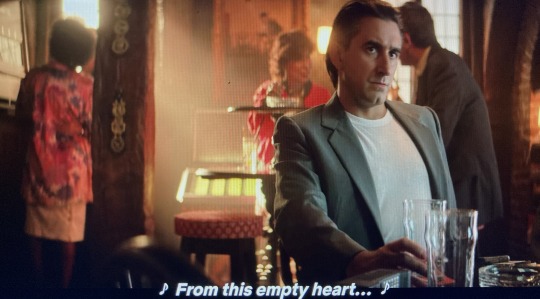
Hm.
Literally what else could I say. I'm being slapped in the face with pining and angst and longing.
Here are the lyrics:

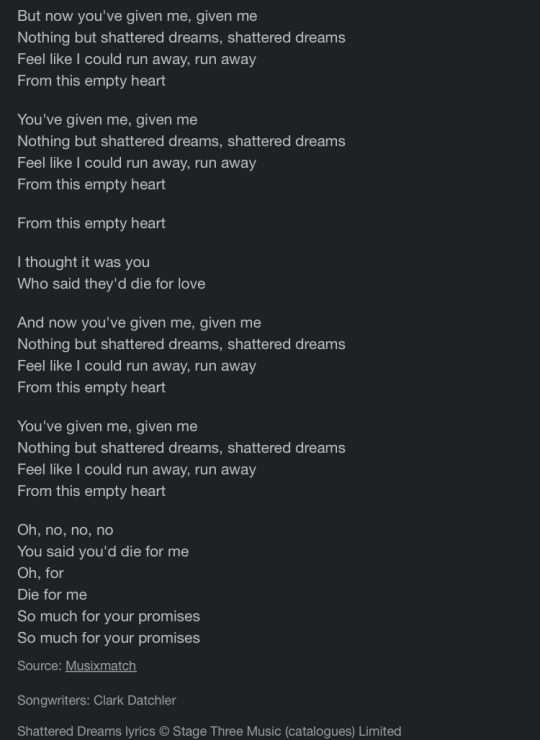
Some noteworthy lyrics:
"So much for your promises/They died the day you let me go" - this breakup man
"Caught up in a web of lies" - another lie motif
"I thought it was you/Who would stand by my side" - the theme of Dream and Hob being constants in each other's lives
"Shattered dreams" - I could scream. The title of the song. SHATTERED. DREAMS. giggling rn.
"Woke up to reality" - I think that's a very interesting line toeing between the constant references of the Waking and the Dreaming
Basically, I've been noting these evident similarities within the songs to align themselves to Dream and Hob's situation, and it's clear that the director/writers chose these songs with intent of it paralleling Dreamling.
So that makes it even more insane when lines like "From this empty heart" are meant to parallel Hob. Like.
Okay, last song.
#3 - "Keep On Moving" by Soul II Soul
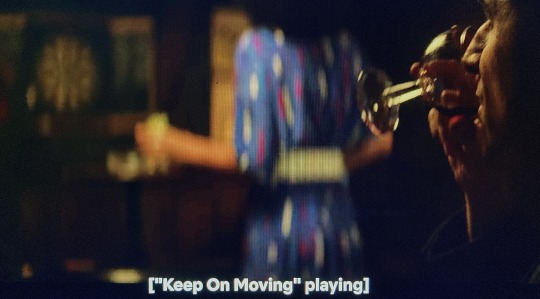
This song plays as the night progresses. It's late, it's clear Dream isn't showing up, and Hob is feeling pretty final about that, and perhaps he's accepted it at this point. Dream isn't coming.
So this is where he speaks to the bartender and that scene ensues.
Here are the lyrics:


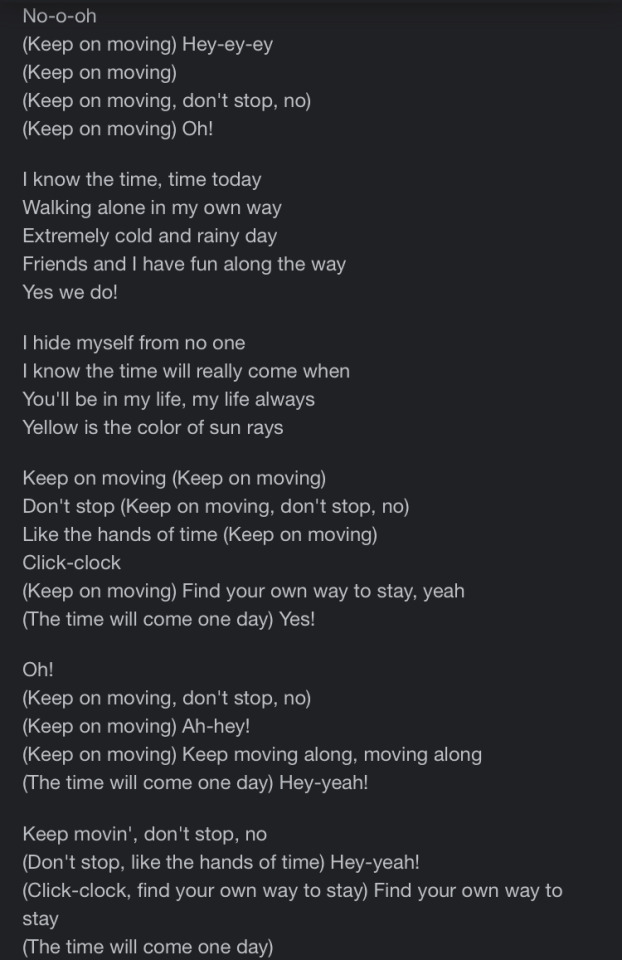
The themes of time and clocks are super prevalent within this song, and again it's once more clear how heavily this reflects and represents Hob.
Noteworthy lyrics:
"Why do people choose to live their lives this way?" - I think this also uniquely touches on the general aspect of humanity and one's reason to live/love life. Dream battles with his confusion/slight disappointment for humanity at the beginning, as he asks Death, "Why would any sensible creature crave an eternity of this?" And then Hob helps Dream realize why there's so much to live for. (24:30)
"I know the time will come today/The time will come one day"
"Walking alone in my own way" - Again this idea of walking alone and needing company.
"You'll be in my life, my life always" - Dream and Hob being constants again.
This all goes to say - Hob cares. He cares for Dream.
And I just think that's very beautiful. The magnitude with which Dream's absence means to him and how much their friendship/companionship both means to each of them. I just think their connection is a beautiful thing that I love seeing and rewatching. Wonderfully, these songs give the audience even more layered insight into this connection.
This was super long, and I apologize if I went on some tangents. But I also just couldn't help it, The Sandman is so incredibly rich in its storytelling and its connections and dynamics that I had to write this all down. I also just very much appreciate the amount of care and detail that goes into every aspect of television, and needle drops such as these three songs are no exception.
Thank you for sticking with me through this! Can't wait for season 2!
#i have more thoughts#i think i will never fully be satisfied with this post#there will always be too much to say#but wow#they CARE#there's LOVE there#genuine love#i love them#dream the endless#lord morpheus#king of dreams#hob gadling#hob#dreamling#dreamling meta#dream x hob#the sandman#music as outlets to the soul#and emotion#music#the sound of her wings#men of good fortune#i hope whoever read this enjoyed!#thank you
288 notes
·
View notes
Text
Taichi's stance on the other Chosen Children - and why it's not always immediately visible
... Spoiler alert: It's because canon depictions don't let him dwell on it a lot, but as I've already deduced once before: He struggles once he gets isolated from the others (either self-imposed or involuntarily and, unfortunately, that happens a lot).
I do have my very own view on how he feels about every other Chosen Child (mainly the Adventure squad, but I'll try to do my best to analyze the 02 kids too), so I'll try to keep each paragraph brief. The main sentiment is that ALL characters have a certain impact on Taichi - some more than others, of course, but it shall not be overlooked how important each of them is (becoming) to him.
Yamato:
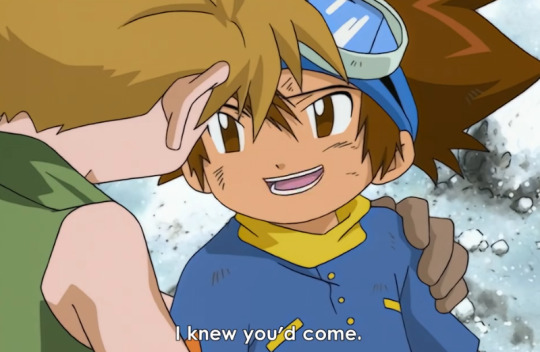
As it was pointed out various times before, Taichi and Yamato have a theme of "opposition" going on. They're often portrayed to have different viewpoints and values, literal fire vs. ice, which causes them to clash with each other a lot. But despite their tendency to fight, Taichi has this unwavering trust in Yamato that had been growing throughout their Adventures in the Digital World. He may be better at understanding and observing Yamato than Yamato is actually aware of (especially in terms of their similarities as protective older brothers). And since he trusts and believes in Yamato so much and wants to be on the same page - they (will) have saved the world together several times after all -, it usually doesn't do him good when they're at odds. Which is, mostly, initiated by Yamato and very particularly after their argument in the Dark Masters' Arc. Despite his stubbornness and hotheadedness, Taichi contemplates and overthinks a lot when they're fighting - and is basically suffering like a wounded puppy whenever it happens. I'd say he enjoys the playful (!) bickering in 02 onwards, but gets stressed out and defensive when it comes to the unresolved fighting. He obviously cares for Yamato and will definitely turn to him as his equal battle (and moping) partner. [How I see their ship compatibility]
Sora:
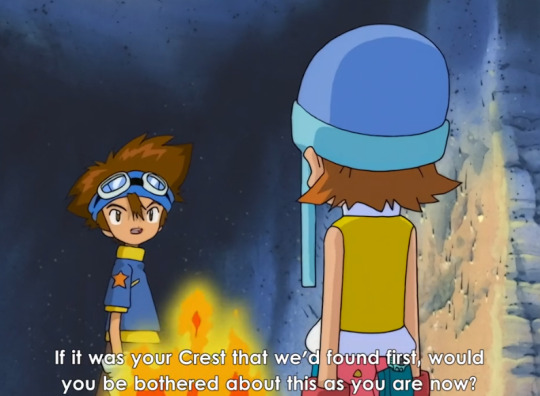
I think it's not exactly exaggerated when I say that Taichi isn't the most... Socially adept person when it comes to dealing with women. He has a tendency to either idealize and overprotect - or, as it is in Sora's case, doesn't find the right words to approach them. He 100% values Sora as one of his oldest friends and absolutely cherishes her caring nature - he's seen it ever since they've been partners on the football pitch and observes it closely among their companions in the Digital World. So when Sora lashes out at him for "not understanding her", it catches him off guard every time. The question is if he really misjudges her - whether it's when he calls her loving, caring or gifts her a hairclip - or if he actually subconsciously understands her better than she does herself. (She IS struggling with an identity crisis after all, and him not fully getting that kinda makes sense, since she's never filling him in.) He knows he can rely on her to take care of the others, his sister in particular, and generally trusts in her as an equal. He seems to develop a habit of not wanting to get into her business (mostly in 02 onwards), and may keep a respectful distance in Tri onwards, but will still jump in to either protect or push her if he needs to. [How I see their ship compatibility]
Koushirou:
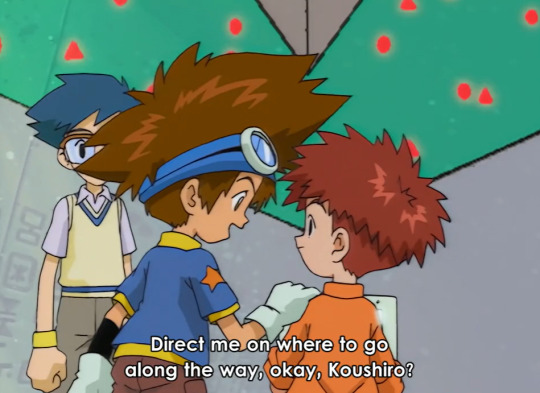
I like to refer to Koushirou as Taichi's complementary right-hand-man - and even though Yamato and Sora may deserve the same title at varying parts of the series, all three of them fulfill different roles for him. If you want to get particularly cheesy, you could say that, in a battle-related context, Yamato is his (other) fist, Sora his heart (while Hikari is the soul) - and Koushirou is the brain. From episode 1 onwards we can tell that these two have known each other before and seem to be close in similar ways as Taichi and Sora are - and even if Taichi starts off misunderstanding Koushirou's love for technology at first, he quickly learns when and how to rely on his expertise. Similarly to how he relies on Yamato in later parts of the series as his fighting partner, he thoroughly and vocally relies on Koushirou to help him find the right path, strategy, approach - and even if they do clash a little here and there, they will always find ways to reconcile. There's also, once again, the theme of him turning into a wounded puppy when they're not on good terms - but that, once again, applies to Sora and Yamato too. One aspect of Adventure to be mentioned on the side is that Taichi may even have put Koushirou on a pedestal for a while, since he forbade him from fighting - just as he did with Hikari, whom he also idealize(s/d) and tried to protect. (I may also argue that he has a bit of an inferiority complex towards Koushirou + all the smart people around him during Kizuna, but that's him generally feeling lost in comparison to everyone else.) Either way, he will turn to Koushirou whenever there's an emergency with 100% trust, they get more comfortable bickering, playing on-call-dads for the 02 kids and sharing knowing glances as they get older. [How I see their ship compatibility]
Mimi:
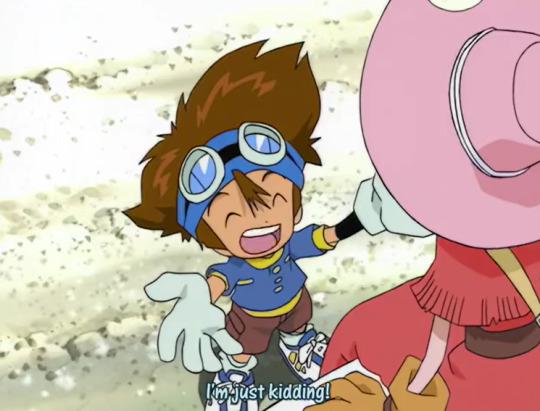
While he doesn't exactly overprotect Mimi, he still has a habit of teasing/grinning about her "royal" attitude. There isn't as deep of a bond between them as there is between Taichi and the three previous characters. However, you get a feeling that, for Taichi, Mimi "is just Mimi", with all her antics and quirks (and only gets annoyed at that when she is overdoing it like in the Princess episode, but aside from that, he doesn't mind it and doesn't treat her like a "girly girl"). There is just a general sense of acceptance and treasuring. [How I see their ship compatibility]
Jyou:
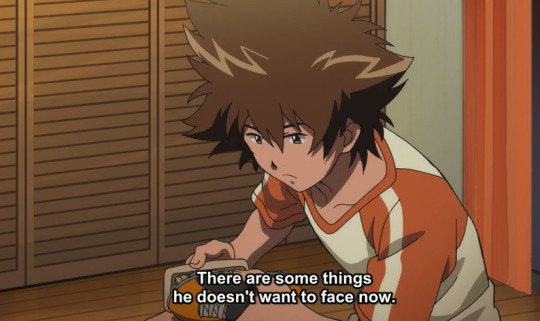
Once he has gotten over his first impression of Jyou being "a stingy, wimpy know-it-all", you can tell that there is not only growing respect, but a general sense of comfort between them. I'd say that this may have increased even more after Jyou reassured Taichi as their leader - and the older they get, the more Taichi seems to be able to understand and relate to Jyou's previous (and ongoing) struggles and doubts. I like that there is an underlying theme of mutual admiration at various points in their lives. [How I see their ship compatibility]
Takeru:
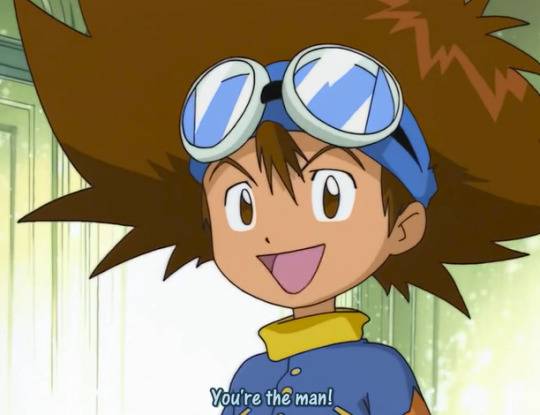
While they clearly do have a sibling dynamic going on, it's interesting to see that Taichi doesn't coddle Takeru - quite the contrary. From day 1 on, Taichi treats Takeru like an equally important part of the group, gives him tasks and encourages him to believe in his abilities. By the end of the series, he even entrusts him with the life of his sister. It can be assumed that he's able to tell that the relationship between Takeru and Yamato is a little rocky and tries to reassure Takeru in that Yamato would never abandon him (once again reaffirming his own trust in Yamato as well). Either way, one can tell that he absolutely cares about Takeru. [How I see their ship compatibility]
Hikari:
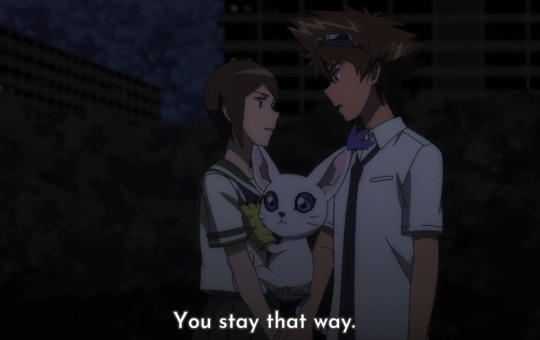
In general, it can be said that the relationship between these two siblings is quite close - not only did Taichi take care of Hikari ever since they were little; due to their rather traumatic experiences, Taichi may also idealize/put Hikari on a pedestal and definitely had to grow out of his overprotective tendencies and self-guilt-tripping as he grew older. He adores and loves Hikari to the core and doesn't exactly coddle her, knowing that she is indeed capable - but he's also terrified of the idea of being the reason for her getting hurt again. I'd say, as of 02 onwards, he doesn't feel as thoroughly responsible for her as he used to, but it would be foolish to assume that the trauma of almost having caused her death as a kid didn't leave a lasting impact on his fear of causing collateral damage. There are instances of natural sibling bickering between them. And I'm sure, if Taichi could, he'd like her to stay as idealistic and empathetic as she is - as depicted above. They both know the necessity to fight, but it does feel like he doesn't want her to shoulder the same burden he does. [How I see their dynamic in general]
Daisuke:
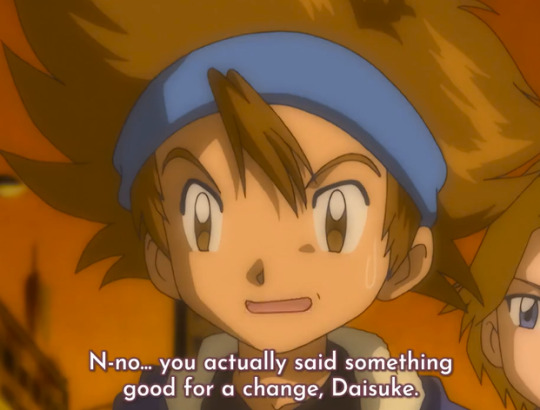
After Hikari (whom he idealizes) and Takeru (whom he mostly treats like an equal), Daisuke is like a third adopted sibling - and while it's not exactly clear how he feels about it, I would assume that Taichi kinda enjoys having someone who looks up to him. He may tend to underestimate him at times or call him off as too rash, inexperienced or short-sighted. However, we can also assume that he sees parts of his younger self in Daisuke - and can now laugh about that. Also, I'd say he is actually impressed by the way Daisuke is different from himself, especially his more idealistic attitude. Taichi Yagami, as pointed out so many times before, is someone who believes in his friends - thus he also believes in Daisuke to make it one way or another. And I'd even argue that he kinda admires Daisuke for believing even more thoroughly than himself. [How I see their dynamic in general]
Miyako, Iori & Ken:

Pinpointing Taichi's exact stance on these three is incredibly difficult, because he tends to refer to the 02 group as a whole mostly as "Daisuke and the others" - meaning that he acts like a protective part-time-dad for them most of the time and tries to teach and warn them about the dangers and horrors that he/they have gone through before. It can also be assumed that his wrath towards Ken has completely vanished post-redemption, as he is not a particularly resentful person when it comes to people who show remorse.
#taichi yagami#tai kamiya#my two cents#relationship analysis#digimon#digimon adventure#will i ever stop writing taichi meta?#i don't think so#we should give him his polycule already#long post
19 notes
·
View notes
Text
Ya'll need to learn to love more than one character. Like someone loving a certain character does not take away your ability to love a different character or even their ability to love a different character
Izzy's my favorite character, yeah. But why are people assuming I hate Ed?? I fucking love Ed. I adore him so much. He's so baby girl. He tries so hard to be good and a lot of his worse actions are fuelled by his self-hatred and loss. He's fascinating to me and I want to study him like a bug. The way he distances himself from his cruelty ("technically the fire killed those guys") and how he presents himself differently to different people (the party boy to Jack, the sensitive sap with Stede, the ruthless captain to Izzy) are both things that I fucking love analyzing and talk about to my partner constantly. I love how hard he tries to be a good person! I love how he is slowly learning how to care about people on their terms instead of his own. I love his growth and how much he WANTS to grow
You know who else I love? Stede! His compassion and care for the people around him is so touching and I love that he takes so much pleasure in the little things. I love how we've watched his confidence build since the first episode, where he was constantly panicked and nervous, to a capable captain who still loves his crew but will defend himself and won't take as much shit from people like Nigel. He'll defend his crew instead of hiding like a coward. I love how he delights in details like fancy wardrobes and a cursed suit because he takes pleasure in small things like that! In marmalade and puzzle chests. He's a sweetheart and he rejects the idea that he has to be cruel to be capable
Oluwande was my favorite character when I first watched season one (though I dislike a lot of his season two writing because it feels like they dumbed him down) because he's kind and very intelligent. He cares a lot for the crew and he's extremely capable while also being a little goofy and being soooo bad at addressing his feelings. I love that he was so obviously in love with Jim, but had that first instinct of denying it if questioned because that's so often how crushes work! His little "What? No! Shut up!" When the chief pointed out his feelings for Jim still makes me giggle. He's a little awkward, but he's sweet and he's supportive. He also can be a little shit when he wants to be, like when he basically made Jim confront their past because he was petty about them not telling him about it. He's always got people's backs and there's a reason he was chosen to be the captain during the Izzy mutiny.
Jim is a character who means SO much to me as a trans person. Their arc is so special to me and they're also just... so fucking cool. I love their journey of figuring out who they're supposed to be versus who they WANT to be. Their struggle with what's expected of them and them wondering if they even want what they thought they wanted is so touching. Them defending Izzy is actually so great to me because it shows their loyalty and their need to defend their family. It didn't have to be Izzy, it could be any member of the crew and they would have their back. Because that's what family means to them. "Our dick" says a lot about them, as does their little "He was your friend" line. Jim cares about people even when they're quiter and more closed off. Hell, they stabbed a man in the first episode for insulting Frenchie and they didn't even talk yet! Them being the one to tell the Pinocchio story to Fang was so great because it shows just how soft they really are and want to be.
Speaking of, I also adore Fang so so so much. He's such a sweetheart and he's sensitive and he cares so, so much about his friends. He's a big softie and I wanna hug him. I bet he gives such great hugs. As soon as he's given the allowance to be soft, he takes it. He misses his dog that Ed forced him to kill (which I feel like no one talks about?) and gets blushy and giggly about Lucius finding him attractive. He's just!! So fantastic
I wish we knew more about Ivan because I love him and I have so much fun imagining stuff about him. Like how I hc him as a trans woman
Archie as a character is so fun and I wish wish wish we got more of her because I fucking LOVE everything about her. She's so fun to watch and I want to know how she gets along with Oluwande and I want to see her interact with the rest of the crew so badly. The way she fell in love with Jim because of their hope makes me CRY. I love that she kisses Jim while they're covered in blood and there's a rotten leg like a foot away and she doesn't care. I love her energy and her excitement and every scene with her just makes me grin like an idiot. I'm still so mad about the season being cut because I feel like we could have gotten more scenes with her
Roach is fucking great. My partner and I will quote "meat is meat" at each other constantly. He's so ridiculous and I love him. I love how obsessed with Zheng's soup he is. I love his bitchy "how am I supposed to cook here?" when Stede moves them to live under a bridge. I love how chill he is and the faces he makes when he's reacting to things. He's so funny and I love him
Frenchie is my fucking beloved. His mind box is something I think about so often. How he doesn't want to think about all that has happened to him, but doesn't. How hurt he is. How he fucking deserves every bit of becoming captain of his own ship. The fact that he sings and plays an instrument (I do not know what specific instrument he plays. Is it a ukulele?) and sings about how they're all gonna die with a grin on his face. He's a dork and I love how he hides Izzy at great risk to himself because he cares about his family as much as Jim does. The way he expdcts Ed to kill him and basically offers to do it for him just to get it over with (if I'm remembering correctly). I love his superstition and how he believes it's supported by fact! I think his superstitious beliefs are so, so interesting and I want to know where he learned them.
Wee John is so fucking great. How long has he been doing drag? What happened to his mother with whom he used to make dresses? I need to know! I love that he just wants to set things on fire all the time. I love his line about "I'd love to be stabbed by Jim". I love all of him! He's such a fun character
I love Lucius and how trauma genuinely changes him. He's a bitch and he's petty and he loves gossip. He's the first person to insert himself into a shitty breakup, helping both Stede and Ed at different points. Him keeping Jim's sex a secret and him helping both Stede and Ed is so interesting to me! He's a supportive friend and he's a slut (affectionate) and he's a bitch (affectionate) and everything about him makes me obsessed. I like that Stede has to talk to him about opening up about his trauma! I like that Lucius genuinely loves Pete and how his trauma has made him more bitter. I love how he's still the first person to call bullshit on Ed.
Black Pete actually used to annoy me, but he's grown on me. I love that he's such a dork who struggles with insecurity to the point of making shit up about himself. I love how much he loves Lucius! I fucking adore his one-liners and his delivery of them. He's so fucking funny
I could spend fucking hours talking about Mary Bonnet. I love her so much. Everything about her makes me feral. How she refuses to take Stede's bullshit. Her paintings! Her relationship with Doug that seems so fucking sweet. I love this woman. Please bring Mary back. Please. I'm begging
Buttons is Buttons. Everything about him is fucking fantastic and I want to chew on him like a chew toy
Me enjoying a certain character does not take away from my absolute love of other characters. I tend to talk about Izzy most because I find active displays of tragedy more interesting and Izzy and Ed are the most outwardly angsty characters (which is also why I'm usually talking about Kraken Era Ed when I discuss him). They outwardly express more dramatic feelings rather than characters like Stede or Frenchie who bury a lot of those feelings or express them in different ways. Izzy is from the dramatic genre and I love dramas. Comedy writing is not my specialty
But I can recognize that while I think about other characters a lot, I don't talk about them as often. So expect more metas and discussion of more characters in the future (hopefully. I just write things as I think of them and them to my queue tbh)
#ofmd#our flag means death#izzy hands#edward teach#stede bonnet#wee john feeney#frenchie#frenchie ofmd#roach ofmd#nathanial buttons#jim jimenez#oluwande boodhari#archie ofmd#lucius spriggs#black pete#fang ofmd#ivan ofmd
57 notes
·
View notes
Text
The Sideburns Scheme Post #48

(For reference: The Sideburns Scheme)
Crowley, Good Omens 2, Episode 3, I Know Where I'm Going, with
...
Sideburns Check
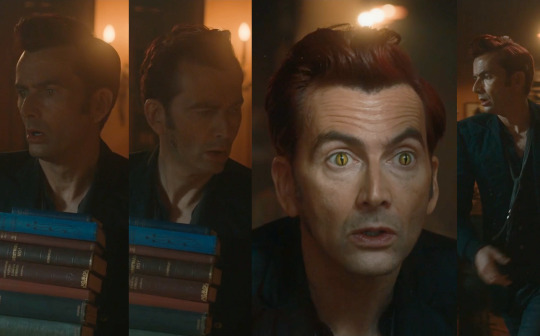
The above image is brightened. The sideburns are long. Again, I would even go so far as to say they can go in the longest-length category. That's typical for being in Gabriel's presence without humans around.
Gabriel is the supernatural presence that affects the sideburns in such a way for most of the present day story.
...
Brighter Red Streak Check
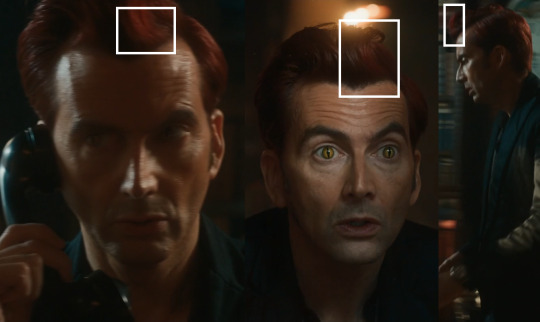
As is often the case with Gabriel's presence, the streak can be found more easily in this scene.
...
Hairstyle Changes
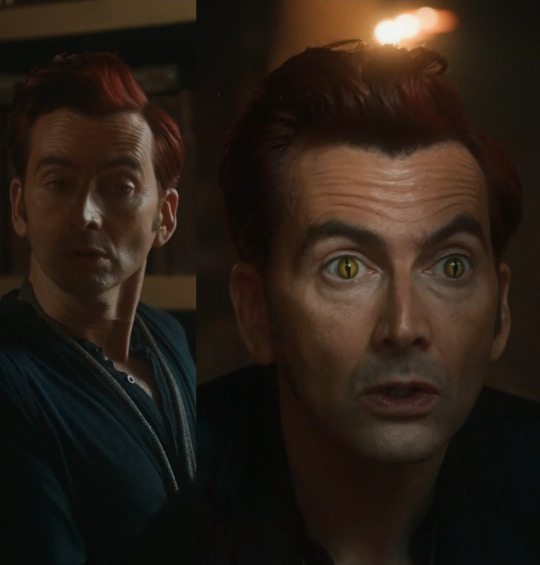
Given the lighting, Crowley's hair looks darker here. The hair in front curls in, up, and back. In the previous scene, the hair near the part curled in, and the front top hair went up and tilted to Crowley's right. In these particular chosen screenshots, the more saturated red streak is more clearly defined with the darker hair.
...
Earthly Objects
(For reference: Earthly Objects | Earthly Objects Study - Windows Part 1)
Crowley is already holding some books in front of his tie, like earlier. He has re-manifested his jacket back on. The books he is holding are showing their back bindings. They were reversed earlier.
Crowley looks at Gabriel as if to ensure he, Gabriel is touching an earthly object and/or sitting down before Crowley moves to answer the phone.
Crowley touches the phone and names the bookshop.
For paying attention to the pockets...
Gabriel's hands are making two pockets, one bigger and one smaller.
Crowley's Tied Hands probably retie. Why do they even need to retie? Did something in the minisode happen to require it? If so, my best guess is Crowley making himself bigger since he used his hands as part of the process, followed by my next bet guess that the minisodes require it if Crowley's next present day scene has him standing.
Also, the book-throwing may again be related to whatever absurdity is happening with the retying here. I still feel bad seeing them thrown around like that.
Crowley does get lights directly above his head and some to the left though these lights are smaller and more blurry than is often the case for the more understood Overhead Lights.
Along the way of answering the phone, Crowley makes pockets with his body and even gets pockets of light on his face when looking toward the window. Such pockets include the phone.
Because I analyze this game to the extent that I do, some of Crowley's excitement seems to come from not just seeing Maggie approach Nina but that Nina has both her hands in her apron pockets.
Crowley hanging up the phone allows him to place himself at the threshold for the window look. The next present day scene is going to be a very special windows sequence he does for the game.
A window look threshold in Earthly Objects has the character looking at the window without a visible earthly object touch on screen when they look. Presumably with the special circumstances of the phone, Crowley is allowed to reset and pause at this threshold for his upcoming sequence.
...
Gabriel has no lines in this scene. He is referred to only by the name "Gabriel" twice from Aziraphale on the phone. He is not referred to by the name "Jim," and Crowley does not say either name himself.
...
Story Commentary
As a general reminder, my sideburns theory goes that Crowley and Aziraphale are borrowing each other's homes to form a special connection.
They are in a phase of doing such a thing at this point the story.
Crowley remotely contacted Aziraphale earlier this episode during Aziraphale's drive.
This time, Aziraphale remotely contacted Crowley.
I've assumed that's one of the steps in the overall process to make this connection happen.
Admittedly, Crowley looked worried before answering and relieved when he did answer.
Another thing I think is relevant is that Aziraphale said "our car" when he proposed near the end of episode 2.
Here, Crowley says "we" twice in representing the bookshop as he answers the phone.
So, now each one of them has verbally claimed their borrowed space as a shared space within this present day story.
...
That's it for this post. Sometimes I edit my posts, FYI.
...
Main post:
The Sideburns Scheme
#crowley#david tennant#good omens 2#good omens#good omens s2#good omens season 2#good omens meta#good omens analysis#good omens crowley#crowley good omens#good omens clues#good omens theory#good omens theories
20 notes
·
View notes
Text
Trying To Analyze Cintagon’s Backstory In The Season 1’s Finale
I know haven’t got a lot of analyze posts to say about the TPC series, but I want to actually fully talk about Cintagon’s backstory here, including truth of Pentellow’s mother, the Green Tree of Life’s conversation, etc. It is because I definitely know it’s still terribly written to this day for me…
Scene Overview
So apparently, Cintagon’s story discloses crucial information regarding Pentellow's origins, her mother's fate, and his own paternal relationship to her. It revelation serves multiple narrative purposes: it elucidates Pentellow's background, contextualizes Cintagon's challenging past decision between the Green Tree of Life’s request (we will get to this bullshit part later…), and establishes a profound emotional connection between the long-separated father and daughter.
Analysis
Cintagon’s Revelation
Lines:
"It was before this pink virus existed."
"Your mother died from giving birth to you."
"So your father was going to raise you like any parent would...But..."
"He had to give you away to someone else."
Setting the Context: Cintagon starts by mentioning a period before the Pink Corruption Virus was created. It contextually shows how this backstory is gonna playout later on within this discussion.
Grief and Responsibility: Cintagon’s statement about Pentellow's mother dying at childbirth, introduced a profound sense of lose as Cintagon's use of "your father" in the third person creates initial distance, building suspense before revealing his true identity to Pentellow.
Conflict and Duty: The word "But..." introduces a turning point, highlighting the internal conflict between his parental love and his sense of duty, evident through his promise to raise Pentellow like any other parent would.

Pentellow’s Curiosity and Shock
Lines:
"Why?"
Innocence and Curiosity: Pentellow's single-word question encapsulates her confusion and longing for understanding of her seeking the truth about her past and more about her family's background.
Cintagon's Explanation and Vulnerability
The Backstory’s Dialogue:
"The tree of life told him to. It said his daughter will become the second caretaker, and will succeed at it. If he's willing to give you to someone else. He was devastated. He thought he could never see her again... Until now. I can finally tell you why I had to give you away."

Forgive me for my stupid computer pen writing skills here....
So basically, this flashback represents Cintagon's vulnerability through the Green of Tree of Life's request in order to have his daughter, Pentellow to become one of the Caretakers. It is testament if he is wiling to give his daughter to someone else. So, remember the promise Cintagon made to take care of his daughter like any other parent would?
Emotional Devastation: This will get heavily influenced and destroyed here, humanizing the depth of Cintagon's long-lasting emotional toll for sacrificing his chance of taking care of his daughter in order to have her become one of the chosen ones.
Revelation of Identity: By saying "I can finally tell you why I had to give you away," Cintagon reveals his true identity as her father, blending relief, regret, and a desire for reconciliation.
Alright, here’s the main fucking problem here…
I don't mind Cintagon being Pentellow's father, but the overall execution of this main storyline arc needed more improvement. It was so underwhelming, rushed, and poorly-written. The initial episodes of Season 1 (1-5, and possibly 6) primarily felt like we were focusing on Cube and Cyan's characters when they basically became caretaker and hero in the first few days. But however, this sudden shift to Pentellow's backstory on searching for her long-lost family feel somewhat abrupt and disconnected.
The buildup to the realization of Cintagon's role as Pentellow's father lacked subtlety, with foreshadowing that was overly transparent. By the conclusion of Season 1, Episode 9, when Polyhedron stated, "Oh, you need to find this guy named uhhhh…. Cintagon," the revelation had become quickly predictable, diminishing its potential impact.
Now we talk about the backstory here. In essence, the Green Tree of Life makes a highly controversial and seemingly unjustified decision, instructing Cintagon to go fuck himself to cease all of his parental responsibilities towards his daughter for a period of 24 years. Let me say this AGAIN...! "A FUCKING 24-YEAR TOLL." I don't like this because The Tree's request was just so unreasonable and poorly justified. Like, the Tree was just seeming to disregard Cintagon's paternal role and emotional well-being, not wanting him to actually take care of his daughter for no fucking reason WHY…!
Overall, this main story arc for Pentellow appears to have been implemented hastily, resulting this storytelling experience with so much of wasted potential. Pentellow dosen’t get a whole lot of character development, Cintagon’s backstory was poorly-explained with the Green Tree of Life being so nonsensical and out of character for the sake of being a asshole toward Cintagon.
Alright, that’s all I’m gonna say here. See yall in my next rant post.
#the pink corruption#tpc#pink corruption#brittcorruption#jsab tpc#tpc deeper analysis#Another tpc bullshit rant
12 notes
·
View notes
Text
Gl!ranboo is not a good person
Gl!ranboo os not a good person. Hear me out, I also wouldn’t classify them as a bad person either? It’s been something that’s been on my mind the last few days and ranboo confirmed some of my thoughts in a stream yesterday. They talk about the original idea to end Gen 1 with the audience not liking gl!ranboo because they made selfish and cruel decisions. I don’t think that would have been enough to make the audience kill them but I could be mistaken, I liked the alternative ending that we got to see.
Continuing in the thoughts I have been having about gl!ranboo not being a good person. Showfall media frames them as the “hero”. The trailers, when Hetch discusses them, gl!ranboo is called the hero of the episodes. Ranboo actively says they just want to go and escape, rather than take down this horrible company. And although still under control of the company, there is still some choice there I’m sure when gl!ranboo decides to rip open patient Charlie and pushes Sneeg and Austin out of the way so he can fit through the hole in the wall. Both these actions are done out of survival instinct, both lead to the death of others, so do we judge that as bad or good? Was it even gl!ranboo if they were supposedly forced to do those thing? Depends on your own moral code. Would you do the same to survive? Or would you refuse to be involved in something that would kill someone.
The thing that was interesting to me is that when gl!ranboo gains more control in ep 3, they momentarily forgets the idea of escape when they find out that some of the other cast members are alive and need saving. This makes them seem more selfless and little more like the hero we are told we are watching. This doesn’t last long before gl!ranboo decides to just escape, wanting to just let the police deal with it.
We are so used to seeing the “chosen one” be hesitant at first but ultimately make the decision to save everyone and any cost, gl!ranboo does not give us that typical chosen one we expect. They kill for their own survival, attempt to make bargains with the bad guys to survive: gl!ranboo begged to be let go and in return they wouldn’t even tell anyone what was going one- leaving many to suffer at the hands of showfall media.
It’s just so interesting to me that regardless of state of gl!Ranboo’s control over themselves, they dance the line between moral and immoral, good or bad. But at the end of the day it all comes down to what you believe is okay in the name of survival
I still love gl!ranboo very much. They are very sad and I just want to give them a hug and a snack without pickles or slime, but they are not your typical perfect chosen one hero. They are a realistic version of a person - at least of one in their circumstances -trying to survive. They are not a good person.
I think it speaks more of the need for things to be black and white in our society, when most of it is just grey and depends on your own moral values
Regardless of whatever I say being accurate or not, props to Ranboo and crew for creating this! It’s true my spectacular and I haven’t had this much fun digging up and analyzing and just in general enjoying a fandom.
#genloss#ranboo#ranboolive#ranboosaysstuff#generation loss finale#generation 1#generation loss charlie#generation loss spoilers#generation loss#genloss spoilers#gen loss#atthuspointtherearenoheroes#black and white#grey area#slimcicle#charlie slimecicle#generation one#genloss ep 1#gl!jerma#gl!hetch#gl!ranboo#gl!nihachu#gl!vinny#gl!sneegsnag#gl!slimecicle#ahhhihavesimuchfunlookingatthemorallygreythatmyparentsarewortiedaboutmelol#itsmydreamticreatesomethinglikethisthatmanessomeonethinkthewayranbooandgenlossaremakingnethink#needgenloss2writersranboo?#gl!niki#gl!austin
91 notes
·
View notes
Text
Very specific MTP anime scene we need to talk about more
Cuz I really like it :]
Spoilers for Moriarty The Patriot anime and manga [specifically the "Noahtic" and brief mentions of "The final problem"]!!
Warning: long post lol
->The "Noahtic" Act 1 and 2
This has to be one of my favorite anime openings to an episode in MTP. It starts off with a man getting hunted by, who we later learn, is Blitz Enders, the "villain" in William's play. The opening itself has a very dramatic look to set the mood. This blood red lighting is usually seen when an important death is about to happen [example: Og William's death].
We don't really learn about the man who got hunted, but rather, we learn more about the hunter; a bit about his personality and why he is the target of William. It shows us that Enders is a man who hunts humans, his targets being peasants [if we analyze the clothing the victim is wearing], and is definitely not going to come out of this experience alive.
Not only that, this scene is important because it plays again at the end of Act 2, when Enders tries to escape from the guards. The scenario is turned on its head, with the hunter getting hunted; the victim in the opening now being Enders, the hounds being the police men and finally, Moran taking the role of the "hunter".
I kid you not, I was so hyped when this scene came to play. I genuinely love the juxtaposition in this specific scene; the differences, the similarities and, the final cherry on top, William's smug smile being the final thing Enders sees before he plunges into the ocean.
I also really like the fact that Enders goes absolutely insane in this episode. Him slowly but surely breaking down, eventually snapping and seeing himself as some sort of savior is so fucking good I was that shit up.
[To expand on the savior complex point, random tangent incoming] When Enders had the whole "I'm getting rid of the rats in this ship" speech, it made me think about William for some reason?? I think it was because of the similar yet very different sense of "justice" between the two. William's sense of justice is more righteous, as he doesn't deny the fact that, yes, he is one of the "devils" he is trying to exterminate, he is very guilty of his crimes, no matter the motive. Hell, the whole Moriarty plan hinges on his death as a way to end the murders. Enders, on the other hand believes that he is righteous and can do no wrong, a very stark contrast to William's methods and beliefs. He is "killing the rats", not because the "rats" have done wrong, but rather the "rats" very existence is wrong, and that the upper class is perfect without them. I'm not sure if this was intentional but yea, it's still pretty interesting.
If there is one thing I noticed about these episodes, its about the victim of this case. In the manga, the victim was a peasant who didn't do much wrong. We don't really know who he is. Maybe William didn't really look into him that hard and was waiting for Enders to choose a random man to hunt, all he needs is to have Enders commit murder and be in the spotlight; it doesn't matter who the victim is.
In the anime, however, we get some information on him; what crimes he committed and how he was paid by Moran to annoy the shit out of Enders. William did look into him, we know that this man, whoever he is, has been specifically chosen by William because he is a criminal.
This difference in both the manga and the anime shows William in two different lights. If we go by the manga's version, we can interpret William with "the end justifies the mean" principle. He is willing to sacrifice a possibly innocent person just to get what he wants, that is, Enders death and putting his crimes in the spotlight. It paints William in a morally grey light, that he is ambitious, and sometimes that ambition can get in the way of his righteousness.
In the anime, William knows and actively guarantees the fact that he [the peasant] is the victim of Enders' crime. He makes sure that the victim is someone who is no better than Enders and that made him William's target, killing two birds with one stone. It paints William in a morally light grey light, that he is much more calculating, and while you can say he is ambitious in his goals, his ambition does not get in the way of his righteousness.
I honestly prefer a mix of the two. I think it was interesting that the victim was possibly innocent, further justifying Enders' death and a reminder to the audience that William is not THAT righteous, that he is willing to bend the rules to his favor, even if it costs an innocent life. It makes William much more nuanced and fits well with his character.
I also really like the plot point where Moran paid the victim to actively annoy Enders; it shows that William really has orchestrated the perfect crime, accounting for every single detail, down to the victim as well.
In short: the Noahtic is a very good episode and I'm glad the anime didn't really shy away from certain details of the story. Do I like the manga better? Yes, while the animation is really well done, I still prefer the manga as it has more plot to it, not to mention the episodes the anime left out [example: The hunting in Baskervilles]. Whenever I recommend MTP, I'll always say "read the manga first if you want more plot", since it's gonna take a while for the next season about the NYC arc to come out lol.
I'll prob make another tangent related to Liam and Sherly but for now I'm gonna go study since that's the reason why I stopped posting online too much.
Have a good day everyone :D
#yuukoku no moriarty#moriarty the patriot#william james moriarty#yuumori anime#mtp moran#mtp william#scene analysis#random rants#from yours truly ;)#rant post#sherlock holmes#Illamda stop yapping no one cares
18 notes
·
View notes
Note
God I really wish we got an Emira episode. I get that there was limited time and any decision made would inevitably leave out somebody, but man. She’s really fascinating to me and has so much character potential regarding her place among the Blights.
for real! like i Get why "protagonist's love interest's older sibling" wasn't given much focus but also it feels odd when amity's *other* sibling got his own portion of an episode but emira didn't get the same
though at the same time, i suppose a decent chunk of why i got invested in her as a character in the first place is in part *because* of the lack of focus she got in the show compared to her siblings. a while back i had some ideas for a few fics about the blight family (especially focusing on post-canon) that i never really got around to writing much of. and the one i ended up starting with was one focussed on emira, because i kinda wanted to like, balance out her lack of content. and in thinking of ideas for that, i looked deeper into her as a character. and the more time i spend analyzing characters, the more i tend to get attached to them.
and there's something so Interesting about how like. the main thing she has (before the timeskip epilogue, anyway) that distinguishes her from edric is that she's the *comparatively* more cautious/responsible one, and that she seems to be almost the leader of the two of them, and that she takes on a sort of caretaker/support role for both edric and amity. (all the while her stated worst fear is being glued to her twin's side her whole life).
like, i know the whole "her main trait is just 'older sister/twin'" thing has a clear doylist explanation of like, that's all they had time for her to be and she served her narrative purpose there. but i have chosen to make my own watsonian interpretation of that, wherein she herself doesn't really know who she is as an individual outside of her role in her family.
an idea that i wanted to explore in fic but never got around to writing is like. she finally gets her wish of getting to be her own independent person. their abusive mother is out of their lives, and their formely neglectful father has stepped up to start taking care of all of them. she no longer needs to be the one taking care of her siblings. and edric has started finding his own identity outside of being her twin, and people have stopped treating the two of them like a matched set. and she's happy but also struggles with it because she's not had this freedom or this chance to really explore herself before.
all the while having to figure out what she wants her relationship with her siblings to be now that she no longer needs to be their caretaker (or mirror image or rival or any of the other roles their shitty home life had forced them into in the past). and wondering if they'll still want her around now that they don't need her to protect then (they do, of course, still want her around. as a *sister* and not a protector)
19 notes
·
View notes
Text
Data Collection, Not Dating
Let’s talk about something real today—mental health, connection, and this thing we call dating. Or rather, let’s reframe it: data collection.
On the latest episode of the Leo MonWell Podcast, I had the pleasure of sitting down with my friend and colleague, Mylika Morton. You might already know her from Love Begins At Home as the Magistrate of Money, but today, we dived deep into her personal journey of healing, self-discovery, and, yes, navigating the dating world with intention.
Mylika shared how back in 2022, during a heart-to-heart conversation, I encouraged her to seek professional help. Not because she was struggling in an obvious way, but because mental health is something we all need to tend to—like a garden. She took the advice, signed up for therapy, and started uncovering the layers of unresolved emotions and past experiences that were still affecting her.
Here’s the thing: a lot of us, especially high achievers, think we can just check a box and be “done” with emotional wounds. But healing doesn’t work like that. Mental wellness is a daily practice. A continuous journey. Just like physical health, it requires maintenance, awareness, and sometimes, professional guidance.
Fast forward to 2024, and Mylika is in a whole new space—dating, but from a healed place. Instead of hoping to be “chosen,” she’s standing in her worth, observing, and most importantly, collecting data. Because that’s what dating should be—a process of learning, assessing compatibility, and making informed decisions about who aligns with your values, energy, and life vision.
We tend to romanticize relationships before we even have enough data to determine if they’re right for us. Think about it: If you were an accountant, you wouldn’t make financial decisions without looking at the books, right? So why do we jump into relationships without truly analyzing patterns, behaviors, and core values?
One of my favorite takeaways from this convo? Each relationship starts as an ember. A little spark. And if nurtured, one of those embers might turn into a full-blown volcano—the one that lasts. But if you put all your energy into a single ember too soon, what happens if it burns out? You’re left in the dark.
This is why dating multiple people (with integrity and transparency) in the early stages isn’t about playing games—it’s about making informed choices. You’re not just “seeing what happens.” You’re collecting data.
So, let’s normalize this mindset shift:
Dating = Data Collection.
Healing = Daily Work.
Attraction = Reflection of Where You Are.
If you’re on your own journey of healing and connection, ask yourself: Am I showing up in relationships as my healthiest self? Am I attracting what I truly deserve?
The answer starts with you.
Let’s keep the conversation going. Drop your thoughts in the comments. Have you ever had to take a step back and reframe how you approach relationships? Let’s talk! Watch the FULL EPISODE:
youtube
2 notes
·
View notes
Note
can you talk about steferine scene in 5x13 with the song "say something" and thank for your others analysis.
When it comes to Elena, Stefan only admits half the truth. He's been that way since the beginning... lies, half truths, secrets. He only admits to things when Elena discovers the truth for herself.
"The truth is, ever since the first time I noticed you falling for my brother, I have been waiting for him to screw something up so badly that you hate him."
He didn't just wait for it, he pushed for it. This was something he did in 3x14, and I explain this every time I analyze the episode. When Damon confronts Elena, he spits Stefan's words at her because it was Stefan who pushed him to lash out. And afterward, Stefan allowed Elena to beileve she was to blame for it.
"So I've been waiting and watching him do all these horrible things. And then every single time I think he's gone too far, he's there for you, sometimes in ways better than I ever was."
And what did Damon do, but took on the role of turning Abby in 3x15. He did this even though he was led to believe she didn't want him. He did this even though he had no hope of them getting together. He did this for the sake of Elena being alive and happy with whoever made her happy. And it's not just the bad things, it's the good things. What he did on her birthday, he might as well have ripped his own heart out to make her happy, that's how much he loves her.
"So the truth is, after a while I just stopped waiting for him to fail because I liked the person that he had become - and I don't want to lose that person."
Here, Stefan is basically admitting to Katherine what he later admits to Caroline. He needed Damon more than he needed Elena. It's in not wanting to lose Damon that Stefan was able to move on from Elena. When he truly felt it was no longer worth fighting for her because fighting for her meant losing his brother.
The chosen soundtrack is twisted because Katherine took over Elena's body. It's about a broken relationship. And even though it's broken, love still remains. The perfect choice because even though the relationship isn't broken, Elena is. Katherine has an insane problem when she takes over Elena's body in season 5. Becuase not only are Damon and Elena deeply in love with each other, Stefan is their biggest supporter lol
Caroline is the last to jump on the Delena wagon.
3 notes
·
View notes
Text
‘Sherlock’ Out Of Fandom. Essay №1
For several years I’ve been writing about ‘Sherlock’ and its actors, Sherlock Holmes and his various adaptations, and a couple of weeks ago I’ve decided: why not to write about it in English on Tumblr? As some of you pointed out, it is not that easy to find any analysis of this show, which is not johnlock-related (at least on the English-speaking websites). So I’ve decided to express my thinking in writing, hoping that it could be useful not just for me, but for somebody else. I have no idea how many essays I’m going to write, but I want to unite them under the title “‘Sherlock’ Out Of Fandom”. And by that I mean that I’m not going to give any attention to the theories and speculations which were based on the incorrect interpretation of the original source (which in this case is the ‘Sherlock’ TV-series itself). So I’m not going to talk about the so called “Johnlock Conspiracy”, or about “season 4 is not real” theories, or about any other fantasies this fandom is so full of. Furthermore – I’m not going to be involved in the discussions which are concerning such theories, so I warn you in advance: if you want to talk about ‘Sherlock’, please be kind enough to talk about the actual show. The show that was actually released on television and not on AO3 in some fics you like so much. That would be a different topic and I’m not interested in discussing it.
Since we established this simple but important rule, I think we can move to the first essay in this series, which is titled
Three things that make ‘Sherlock’ special
The viewers may like ‘Sherlock’ or hate it, but whatever their personal opinions on this show are, they can’t deny that it is indeed very special. And not just because of the unique place it occupies in the ‘multiverse’ of interpretations of the original stories written by Sir Arthur Conan Doyle. And even not because it helped to speed up the revolution that changed the whole TV industry and our perception of it. What makes ‘Sherlock’ really special is its authors’ innovative attitude towards the old narrative. It was a radical break from traditions, which, surprisingly, is still unnoticed – maybe because other subjects interest people more, but maybe because, however radical this break was, it looked so natural that people simply didn’t realize its significance.
This innovation is visible through the entire series, but there are three milestones, which are the fundament for the whole narrative and story-telling of ‘Sherlock’, so let’s have a look at each of them.
The analytical approach to the original material
The fans of Conan Doyle’s stories know that there are basically two ways of bringing them to the screen. The first one is the good old ‘filmization’ – or, to put it simpler, the film adaptation, when the creators take the original story and adapt it to the screen. That was the path taken by the famous ‘Granada’ TV-series, the Wilmer-Cushing series from the 1960s and the Soviet version from the 1980s. The second way is the good old ‘based on the characters created by Sir Arthur Conan Doyle’, when the creators write a new story and add here and there some ‘easter-eggs’ and references to the original source. The best examples here are Rathbone-Bruce movies from the 1940s, the Guy Ritchie’s movies, and all these young sherlock holmeses, extremely old sherlock holmeses, enola holmeses etc. Which way have Mark Gatiss and Steven Moffat chosen? Some may say – both, but the more correct answer would be – none. What they did is what every true scientist is doing when he or she needs to analyze their sources: they’ve read them all, they’ve singled out the essentials and they’ve drawn the balance – which at the end became the carcass of their story. So therefore each episode of their show is not just an adaptation of the original story, and not something new that they invented – it is a profound analysis of the Conan Doyle’s stories which is put under the lens of their own perception. And that makes ‘Sherlock’ not just an adaptation, but a philosophical research both of Sherlock Holmes as a cultural phenomenon and of the world Gatiss and Moffat – and their audience – are living in.
Which brings us to the second point.
2. ‘Sherlock’ tells the story of its own time
Again, the fans of Conan Doyle’s Holmes certainly read many books and articles about the famous writer and his attitude towards his creation, about the origins of his ideas, and about many other things, but what sometimes is overlooked is the fact that all the stories about Holmes written by Conan Doyle are a huge source of historical material. His stories present a chronic of his own time – yes, it has its flaws and it is far from complete, but nonetheless, if the reader wants to know something about the late Victorian and Edwardian era, Conan Doyle’s books are a rich source of knowledge on the subject. And ‘Sherlock’ is the first interpretation of it which is also a chronic of its time. Yes, there were other movies before that which were set in the contemporary era, but how much can a viewer find out about the 1940s from the Rathbone-Bruce movies? Yes, there was a war, and people wore certain clothes and travelled by trains, but who were these people? What a world they were living in? The information on this subject is scarce and hides behind the human drama and detective plots. ‘Sherlock’, on the other hand, is rooted in the time it speaks about – just like the original material it is based on. That’s why Conan Doyle’s stories were so popular, and that’s why ‘Sherlock’ is so popular too. People see in it the world that surrounds them, they know it and understand it, and understanding brings interest and a sense of belonging – the key to any TV-show’s success.
3. As its title says, ‘Sherlock’ has only one main character
The third milestone of ‘Sherlock’ narrative seems at first sight to be more concrete, but it is closely tied to the other two. A long history of bringing to the screen the characters created by Sir Arthur Conan Doyle accustomed the viewer to a certain paradigm. Sherlock Holmes is always accompanied by Dr. Watson, and sometimes (though in fact very rarely) they are joined by other characters, such as DI Lestrade and Mrs. Hudson (more often) and Mary Morsten or Mycroft Holmes (more rare). And here ‘Sherlock’ broke the tradition again: not only did Mark Gatiss and Steven Moffat give the supporting characters important roles, but at the same time they also made Sherlock Holmes a little bit lonelier than he already was by putting his personality at the center of their attention. In the end, it’s all about Sherlock and the circumstances which made him a man he is. Yes, his interactions with other characters are part and parcel of the story, but the fact that Dr. Watson doesn’t have the “exclusive access” to him anymore enriches the narrative and enables the writers to show all sorts of Sherlock’s personality. Suddenly he takes a whole number of roles nobody before thought him capable of taken: he is a son, he is a Godfather, he is the best man at the wedding, he is a close friend of Mary Morsten, a defender of Mrs. Hudson, a sarcastic, but caring younger brother and a tender forgiving older brother. And the main subject of the show is the moral and internal evolution of this extraordinary man. Sherlock Holmes written by Mark Gatiss and Steven Moffat and played by Benedict Cumberbatch is not a legend and not a monument: he is a man of flesh and blood, and it is his extraordinary inner world and not his deduction skills that makes him so unique – and special.
These are the three major things that in my opinion make ‘Sherlock’ a special adaptation of the original Arthur Conan Doyle’s stories. It presents an analytical take of the original source, it perfectly depicts its own time (and its main problems), and it brings Sherlock Holmes at the center of the narrative, making him not just a hero of his time, but a man who has a story all of us can understand, and some – even relate to. In the end, ‘Sherlock’ is not just another adaptation – ‘Sherlock’ is an original story everyone can take to heart without even knowing about its source.
@rey-jake-therapist - tagging you in case you find it interesting
9 notes
·
View notes
Note
Clothing As Fate On Riverdale? SAY MORE
this #theory hinges on a reading of riverdale as comic, or at least riverdale as a show that still operates fundamentally on comic book principles.
in comics, appearance is everything. i mean this in the sense that characters are given distinct looks so that the viewer can easily tell them apart when scanning strips; i mean it also in the sense that since comics are largely a visual medium, we learn who characters are not only by analyzing what they say but also and principally by analyzing how they look. comic characters’ outfits rarely change, because their appearance is how we recognize them, and yet those outfits are significant despite being stable precisely because of what they indicate about different characters’ personalities. think of pierce from zits or pigpen from peanuts or nermal from garfield or — you get the picture; in a comic, appearance IS character and vice versa.
because we need characters to look distinct in order to tell us what they’re like, there are plenty of pieces of clothing in comics whose only function is to communicate something about a character’s personality; this is true in riverdale as well. jughead’s hat is a perfect example of this, given that the show is aware of its purpose — have you ever seen me without this hat on? that’s weird! but the place it’s not weird for a character to literally never be seen without the same hat on is in a comic strip; jughead just doesn’t know that he’s from a comic (yet).
in comics perhaps more than any other medium, clothes and physical traits are chosen to efficiently communicate characters’ existing personality traits, and so it follows that the reverse is true as well, in the sense that donning a certain piece of clothing can also serve to influence or alter a character’s personality or behavior after the fact. this starts to get at the idea of clothing as fate — the idea that wearing something particular has the power to influence or predetermine future events. we see this frequently time in riverdale when characters dress up like fictional characters only to begin experiencing the same plots that those characters did, e.g. betty dressing up as laurie strode and then immediately living the events of the movie halloween or archie wearing a superhero costume for one night and then becoming a vigilante or like. every musical episode. riverdale fundamentally cannot or will not distinguish between a character and someone who is dressed up like them, so dressing up as someone else triggers a narrative shift.
we need characters to look distinct when reading comics in order to be able to tell them apart, so it follows that when characters in the comic that is riverdale come to resemble each other too closely they begin to merge, which is to say they begin experiencing similar plotlines and ultimately similar fates. i have been mostly paying attention on this rewatch to the jasonification of jason’s doubles, particularly archie, cheryl, and chic, but there is also a lot to explore with regard to characters dressing like their parents while in the process of becoming them. (jughead putting on the serpent jacket is the first moment we know he is going to join the serpents; veronica ripping off her pearl necklace communicates more urgently than any words might how strongly she doesn’t want to end up like her parents.) we might even argue that using the same actors in the midnight club sealed the riverdale teens' fates as they became physically and therefore narratively indistinguishable from their parents, doomed to repeat their mistakes.
in summary, pretending to do something on riverdale is the same as doing it for real because everything on the show operates on an equal level of (un)reality; sartorial choices in particular take on additional consequence owing to riverdale's archie comics heritage. thus, in riverdale, dressing up as someone is not fundamentally distinct from becoming them, or at least taking on their narrative role. in this sense, then, clothing is a primary vector through which fate exerts itself on the characters, forcing them to experience plotlines that correspond to what they're wearing even if it was only supposed to be a costume.
43 notes
·
View notes
Text
…the premier for the next episode of AvA6 is out already?
…shoot, guess I need to get moving on all those analysis I still haven’t read for the first one. Had those sitting in open tabs for months. 😓😰 I might just forget writing my own at this point, I know I said I wanted to wait to form my own opinion on Chosen but at this rate I don’t know when I’ll get around to actually doing that. The time commitment I’d need to rewatch and analyze is just not something I can estimate from the outside.
8 notes
·
View notes